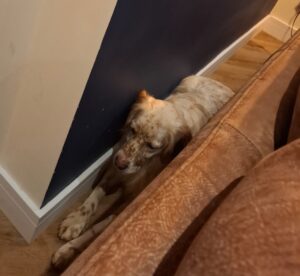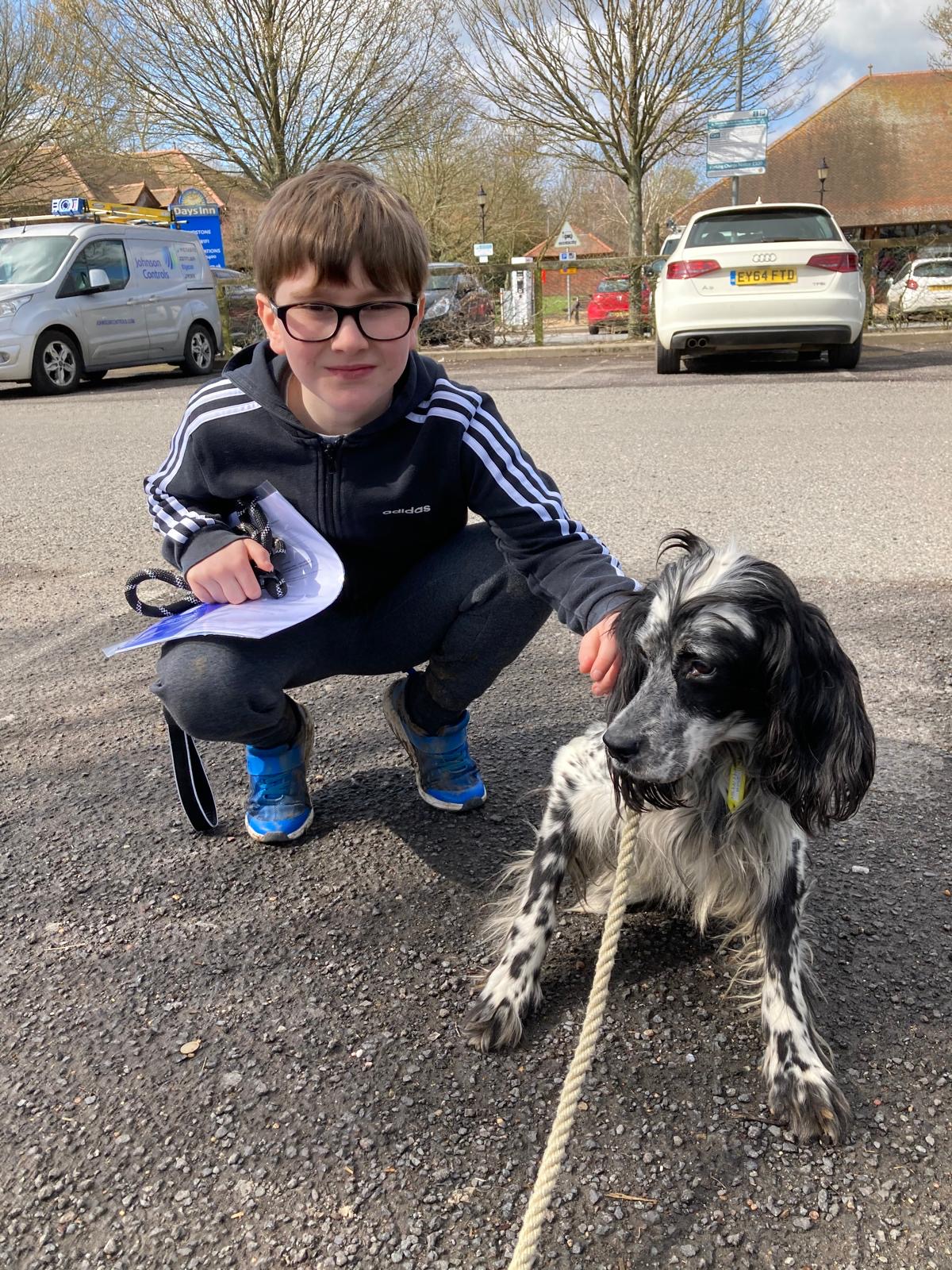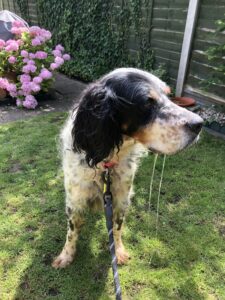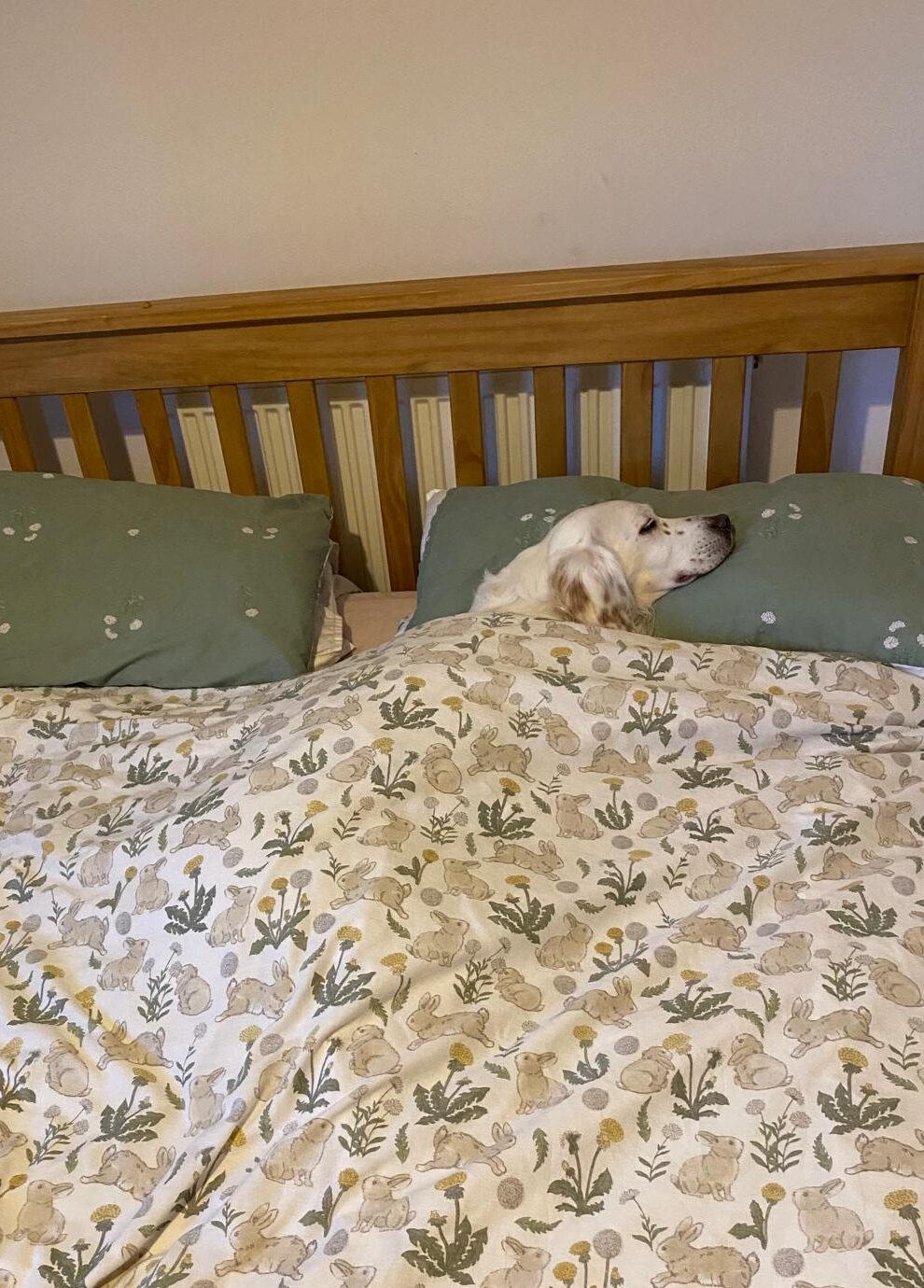Many of us know the feeling of excitedly awaiting the day you get to bring your new dog home (think Christmas Eve levels of excitement x 100!). Whilst welcoming a new dog into the family is a truly wonderful experience, it is not without its stresses and challenges – for you and your new dog.
Here we’ll go through some of our best (tried and tested) advice to help you and your new arrivals in the early days.
Try to put yourself in your dog’s paws for a moment…
One day you’re gallivanting around with other dogs in a shelter… The next you’re put on a transporter van – new people, new dogs around you, new experience altogether. You’re then taken on a journey of around 24 hours, or longer in some cases.
Then you arrive at your end destination where total strangers collect you and take you to this thing called a ‘house’ that you’ve never seen before in your life.
Wow! I think we can all appreciate that it is a LOT for any of us to cope with in such a short period of time. No wonder most of them will arrive very low on spoons!
(If you’re wondering why on earth we’re talking about spoons – Please read The Spoon Theory blog)
Whilst all the humans along every stage of their journey do their very best to make sure the dogs are well cared for and that stress kept to a minimum. It is unavoidable that these dogs have had their entire world as they’ve known it, totally changed in a 48 hour spell.
Starting on their next (and what will be the best) chapter of their lives, is incredible. But it’s a lot to contend with in the early days. These dogs have arrived at a home where new families have promised to love, care for and support them – but the dogs don’t know that yet.
No two dogs are exactly the same and whilst some dogs seem to stroll into a new home and settle very quickly, other sensitive souls take a lot longer to find their paws in their new home.
The house
Arriving home with your new dog is an exciting moment. But it is important to remember that for the majority of the dogs we rescue, this is the first time they will have ever been in a home environment before. This means your home is full of lots of new sights, sounds and experiences your dog may have never encountered before. Which can conjure up a mix of emotions in your dogs – excitement, curiosity, and for many dogs fear and anxiety.
Some dogs will charge into a new home and want to explore everything with seemingly little fear. Whilst it’s wonderful (albeit chaotic) if your dog is like this because they don’t seem to be scared by their new environment, it is important to remember that the new environment is still incredibly stimulating and overwhelming for them, so even though they may seem more nosey than scared, they will still be losing spoons very quickly.
Things that may be overwhelming for your dog in the early days:
- Unfamiliar objects – this could be quite a lot of things in all fairness. Whilst it’s highly unlikely your dog will be scared of everything in the house, it’s not unusual for them to suddenly seem spooked by a seemingly inanimate object – for example, an umbrella propped up in the corner of the hallway or a bag that has been left somewhere unusual
- Sudden loud noises – this could be anything from you accidentally dropping a cup to a resident child yelling mid-play, vacuum cleaners, washing machines, TVs, etc
- Thresholds – yes, crossing the threshold can be a very daunting experience for some sensitive souls
- Doors – the sudden opening and closing of doors can be scary for some dogs at first. After all they don’t know what or who is on the other side of them.
- Reflective surfaces – always a fun one! Glass in doors, mirrors, oven doors, if your dog can see their own beautiful face staring back at them they won’t realise that stunning creature is them. They may try and play with their new twin or be a bit spooked by it.
- New dogs (see dog introductions blog).
- New people (see dogs and children blog).
- New other animals (see introducing dogs and cats blog).
Some top tips to help them settle in:
- Be mindful – do the ‘noisy jobs’ before your new arrival lands. In the early days we all make mistakes without thinking and will turn on a dishwasher or drop something noisy and then feel awful because we gave our dog a fright. Just try and consider where they are in the house before doing noisy tasks until they’ve had time to settle in and you can slowly let them gain confidence around the house.
- Keep counters and surfaces clear – many dogs will be tempted to countersurf in the early days. Making sure you don’t leave food unattended or that roast chicken on the bench can remove temptation.
- Clear away toys, shoes, valuables, etc. Not every dog will arrive at a new home and want to steal your slippers or chew anything they can get their paws on. However, removing temptation can help you keep your valuables safe, prevent them from getting damaged and most importantly ensure your dog is safe too.
- Cover reflective surfaces if needed. This could be closing curtains, putting some tape across your patio door to stop your dog running into it, or hanging a sheet over a mirror in the early days.
- Manage spaces – if your new arrival needs space from other animals in the house, or you want to zone off children areas in the home, then using babygates is a really helpful tool to do this.
- Respect their safe space – (more details below)
- Keep their world small – avoid unnecessary visitors, etc in the early days (more details below)
Some dogs will be far more relaxed in the garden than in any space surrounded by four walls. If your dog is particularly stressed in the house, give them the option of going in the garden with them and letting them take some time to decompress outdoors.
Remember new arrivals can still get easily spooked outdoors. They are typically used to living in the more rural parts of Spain so sudden unexpected noises like cars or vans, people shouting nearby or even thunderstorms or fireworks can spook them. We’d advise using a long line in the garden with your new arrival so you can ensure they’re kept safe when settling in and they don’t try and escape a garden if spooked by something out of your control.
Pacing… and pacing
One of the most frequently asked questions we get from adopters when dogs arrive at their new home is… They’re pacing a lot – is this normal?
Our answer is a resounding – Yes!
As we’ve already established, this is a stressful time for your dog. When feeling stressed, anxious and even a bit excited, dogs will often pace. They are in a whole new environment, may be curious about their surroundings and don’t really know where to put themselves. So they will pace.
It is important to know that they will settle. In their own time. You’ll likely find they will pace for a spell, lie down for a spell, straight up and pacing again, another brief break, then back up for some further pacing.
It’s an anxious time for everyone when a new arrival is pacing. The best tip is to try and settle yourself, when you settle, they settle. You’ll find if you get up and start moving, they’ll likely get up and follow. The pacing won’t continue forever. Give them reassurance if they come to you, don’t crowd them, keep calm and give them the option of a safe space they can retreat to at their choosing.
Alongside the pacing, another common symptom of a stressed dog on arrival is excessive drinking. They do have access to water on their journey over. However stressed dogs will drink excessively. Don’t take away their access to water but try to distract them from gulping down bowls at once. It’s also important to be aware of this as the more they drink, the more they’ll need to urinate, so keep an eye out for them needing the toilet more frequently if they’ve been drinking large amounts.
Other common signs your dog is feeling a bit stressed include:
- Panting and drooling
- Loss of appetite
- Cowering or hiding
- Trembling
- Tail tucked between their legs
- Irregular bowel movements – including diarrhoea or increased bowel movements
These symptoms will quickly improve as your dog starts to settle.
Safe space
It is really important to make
sure your dog has a safe space and this is respected.
So what does this mean exactly?
A safe space is a designated area where your dog can go to relax, be comfortable and gather spoons.
When they first arrive, the dogs typically tend to find their own safe space and lie down there. Very often this is a very uncomfortable spot – if you give them a beautiful new comfy bed, they may lie down on the hard wood floor next to the bed instead. They will very quickly find the joys of home comforts and learn to love their beds, sofas, etc.
Some dogs will seek to hide when they first arrive. So they may designate their safe space initially as under a dining table or behind the sofa. This will change as they settle in and gain confidence. If your dog ‘hides’ on arrival, let them have the option to treat this as their safe space and respect it as such. Don’t force them out. The more support and reassurance you give them by respecting this space, the more quickly they will gain confidence and venture out.
Important points for creating a safe space:
- Make sure they have somewhere comfortable to retreat to – this can be where you place their bed, throws or towels
- This space should be somewhere quieter in the house but in the early days especially it should not be somewhere your dog is left alone as they will likely be stressed out by being left
- Safe spaces are dictated by who else is in the home. For example, in a child free, pet free home, a dog can pretty much determine their own safe space and you can make sure there is a comfy bed there and respect that. However if you have other dogs, cats, children, visitors etc you should consider these in your dogs safe space.
- Your dogs safe space may be with resident dogs – in the early days this may not be possible and they may need to have separate areas
- Safe spaces should be away from other animals safe areas (eg. cats)
- Any children and/or visitors to the house must know to respect your dog’s safe space. This means they must leave your dog alone when they’re in their safe zone. Any visitors or loud gatherings in the house etc should be away from your dogs safe space.
Think of your dog’s safe space as their safe haven. It needs to be respected as such.
We do not advocate the use of crates on the dogs we rehome. Many of the dogs we rescue have sadly had negative experiences of being kept caged by their former owners and we want them to live their new lives away from this. Crate training a dog from scratch can be highly stressful and problematic for a dog if not done correctly, so we avoid the use of closed crates on all the dogs we rehome. If your resident dog is happily crate trained – that’s wonderful, but we request any new dog we send you is not put in a closed crate.

Small world
The prospect of a new dog is really exciting! You can’t wait to take them on lovely walks and your family and friends are buzzing to meet your latest family member. Well there is plenty of time for that.
In the early weeks, the very best thing you can do for your new dog is to keep their world small.
Your dog has already been through a very overwhelming process to get to you, so they need time to decompress, gather spoons and recover so they can start their wonderful next chapter with you. By doing too much, too soon with your new dog, this can end up delaying their progress by overwhelming them further. Go slow and keep it small, then gradually build up as they settle in.
Key tips for keeping their world small
- Walks – for those of you with resident dogs you will have to do your intro walk on arrival, however some dogs will benefit from a few quieter days on arrival and this may mean no walks initially.
As wonderful as walks are, it is important to remember that walks come with their own new sights, sounds and experiences and even the most confident of dogs can lose a lot of spoons on a walk in the early days.
Go back to basics, let them have some easy enrichment activities in the garden and give them the opportunity to settle in and start to bond with you.
Keep any walks they do go on fairly quiet and routine in the early days to prevent them becoming overwhelmed.
It won’t be long before they’ll be ready to do those long hikes with the family, but give them a chance to settle in first. - Trips – on a similar theme to walks, keep any trips out off the agenda in the initial days/weeks. Any trips down to the local beer garden or cafe can wait until a few months down the line.
- Visitors – they can wait! No unnecessary visitors to the house while your dog is adjusting to life in their new home.
- Baths – sometimes the dogs can be a bit on the smellier side when they arrive. While it is tempting to run them a bubblebath and get them all cleaned up – WAIT! Baths and trips to the groomers are highly stressful experiences. Wait till your dog has had time to settle in before this happens. In the meantime a damp towel or doggy wet wipes can work wonders in giving your dog a bit of a freshen up while minimising stress.
- Vets – of course if there is an emergency with your dog, take them to the vets! However routine health checks, etc can wait until they’re more settled. All of the dogs have been to the vets prior to their journey over to the UK so try to minimise any unnecessary vet trips while they’re trying to settle in.
- Company – your new arrivals shouldn’t be left alone in the early days. You will likely find you have gained a new shadow when your new dog arrives. Many dogs will become extremely stressed if left home alone in the early days and it’s not uncommon for them to suffer some form of separation anxiety. You should plan your first weeks with this in mind so they’re not left for any prolonged periods. Once they start to settle in then you can slowly start to work on building their confidence to be left in the house for short spells.
Night-times
Sleeping arrangements for new arrivals vary between households.
As already mentioned, your dog tends to become your shadow when they arrive and they gather a lot of comfort and reassurance from having their new humans nearby. This means suddenly leaving them alone at night, even if they’re with other dogs in the household, can be an extremely stressful experience for them.
The easiest option, although this isn’t for everyone, is that your dog has access to your bedroom, and they have a bed in your room or close by. They’ll likely then sleep because they know where you are, you’re close and in return you will be able to get a decent night’s sleep.
This isn’t always an option for everyone. If your dog can’t have access to your bedroom at night then you need to be prepared to keep them company while they’re settling in.
Don’t just leave them alone at night to cry it out. This is extremely stressful for your dog and it’s also doubtful if you’ll get a good night’s sleep listening to your poor dog crying in another room. You may have to camp on the sofa for the first few nights while they settle in and gain familiarity with their surroundings. They will be able to be left alone at night in time but this will vary depending on your dog. The more support you give them early on, the quicker and easier they will settle.
Manage expectations
You need to be realistic with your expectations for your new arrival. None of us are perfect, so why do we expect our dogs to be?
There’s a well known quote that…
‘You can’t change a dog’s past, but you can rewrite their future’
This is true. But in order to rewrite their future you need to make sure you offer them the support and patience they need to settle in.
The early days of a new arrival are exciting but stressful and exhausting – for us and our dogs!
This whole new life is brand new to them. Most dogs cope amazingly well in spite of everything they have been through in their lives.
Many people choose to adopt a rescue dog in order to give them a much needed second chance at happiness. This does require work on your part, but we promise it is the most rewarding work you will ever do.
Reach out to your rehomer if you have concerns or need any advice. All of the team have experienced the highs and lows of new rescue dogs arriving so we know how equally wonderful and chaotic this can be. We’re here to help.
Key takeaways
- Keep calm and manage their spoons (and yours)
- Go at their own pace
- Don’t expect too much too soon
- Don’t compare them to other dogs – no two dogs are exactly the same. They will all settle in their own time and have their own experience.
- It’s a journey! Progress is rarely linear. There will be hiccups along the way and that’s just a normal part of life.
- The early days can be exhausting, but your dog is more than worth the effort.






